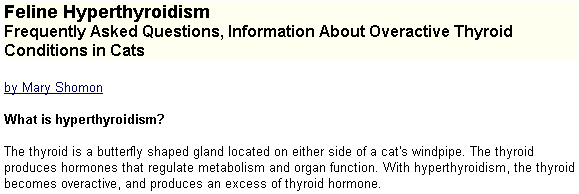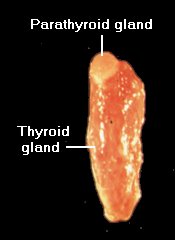Our cat Sophie is radioactive right now.
Let me explain. She was recently diagnosed with hyperthyroidism, a condition that can afflict humans as well as cats. It's a common condition in older cats; usually a benign tumor causes one of the cat's two thyroid glands to go into overdrive, producing far more hormone than the cat needs.
This is one area in which a cat is superior to humans. (Wait a minute! If you ask Sophie, she's superior to all creatures in all ways!) With the human, the thyroid is a single gland shaped like a butterfly and wrapped around the windpipe. (Remember from high school anatomy that the "isthmus" is the part that's around the windpipe, connecting the larger parts on either side?)
http://arbl.cvmbs.colostate.edu/hbooks/pathphys/endocrine/thyroid/anatomy.html
Whether a human or a cat, treatments for hyperthyroidism include medication, surgery, or radiation therapy. The standard radiation treatment is to administer radioactive iodine. In cats or humans the body sends iodine to the thyroid. It's very rare for both of the cat's thyroids to be diseased, and the radiation attacks the gland that has the tumor.
The cool part is that the thyroid that isn't diseased doesn't get zapped but the other gland does. The healthy one has been dormant because the pituitary has been shouting "Hey! Enough thyroid hormone already!" After a while the good gland wakes up, and in a month or so Sophie will be neither hyper- nor hypo-thyroidic.
Only 1% of cats require supplements after radiation treatment, and 97% are cured.
http://www.catthyroid.com/treatment.htm By contrast, it's common for humans to produce too little hormone after treatment, requiring supplemental hormones for the rest of their lives. (Some people think the first President Bush ran a lethargic re-election campaign in 1992 because his supplemental hormone wasn't properly calibrated after he had radiation treatment for hyperthyroidism.)
We had Sophie treated by Dr. Judy Violante, who operates one of only a handful of clinics in Michigan licensed to perform the procedure. She administered the medicine to Sophie and kept her in a lead-lined room for 4 days. Dr. Violante explained that the authorities, including the Nuclear Regulatory Commission, police their procedures very carefully.
We picked Sophie up this morning. Dr. Violante went over the safety procedures for us. We have to be careful for a couple of weeks; the half-life of I-131 is 8 days. We have to wash our hands and be careful to flush her waste:
W H I T M A N, Mass. — Be careful what you do with your radioactive cat poop.
William Jenness agreed to pay a $3,856.47 fee for mishandling his cat Mitzi's litter box.
Jenness took Mitzi, 11, to a local clinic to treat her hyperthyroidism. The treatment involved giving the feline an injection of radioactive iodine, and Jenness was given strict instructions to flush his pet's waste down the toilet, rather than throw it out.
http://abcnews.go.com/sections/us/CrimeBlotter/021030crimeblotter.html
The funniest part was when the vet brought out a Geiger counter and went close to Sophie so we could tell she really is a radioactive cat. The meter jumped at the sound leapt from tick... tick to tickety-tickety as she approached our newly hot feline.
Sophie was glad to be home after a few days' absence but Judy is understandably shy about petting her; you've got to wash your hands frequently. I told Judy "Geez, you're avoiding Sophie as is she were radioactive!"
There is a lot of good information on this topic on the Internet. I was surprised to find one self-styled "expert" getting the facts wrong. The author's ignorance of cat anatomy is an object lesson in the risks of Googling without a skeptical mindset. Herself a thyroid patient, she writes about the cat as if it had a single gland as humans do:
 http://www.thyroid-info.com/articles/cat-hyper.htm
http://www.thyroid-info.com/articles/cat-hyper.htm
Unfortunately the author confuses human and feline anatomy. The single "butterfly" gland describes the human setup, not the cat's. The author also states that the radioiodine is injected into the cat; while that's a common scenario, Dr. Violante administered an oral dose to Sophie using a pill pusher.
The author, one Mary Shomon, has written a lot about health issues; she authors the Thyroid section of About.com. Her other qualifications include writing the 1993 Washington, DC bestseller, "The Single Woman's Guide to the Available Men of Washington." She also says "I have a Bachelor of Science degree from Georgetown University in Washington D.C." Er, a BS in what area?

You would think that About.com would choose someone with scientific or medical credentials to cover health matters. A friend once told me that the About.com "guide" on Mexican cooking is a numbskull who knows very little about Mexican cooking. In that case the risk is obviously minimal. If About.com's guide on thyroid disease has no relevant credentials (beyond having had thyroid disease and writing a lot) then you've got to ask how serious they are about providing authoritative information. My dad had an electrical engineering degree, became an aerospace engineer for NASA -- and also had heart disease. All respect to my dear departed dad, if he'd written about heart disease I wouldn't take his words as medical advice.
Reminds me of the old skit on NPR where the guy gives a whole bunch of bogus science info and then says you can trust him because "I have a master's degree ... in
SCIENCE!!" No thanks, Ms. Shomon, I'll get my information from veterinarians and from trusted university sources.



